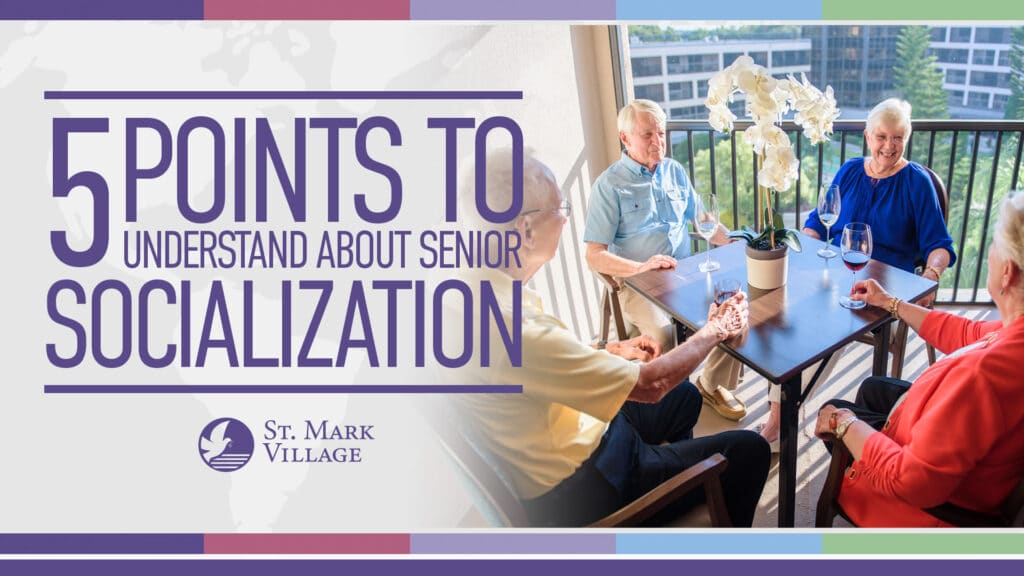
Humans, by nature, are social animals. We all have social needs, no matter our age. As the pandemic clearly illustrated, meeting those individual social needs is essential to maintain a happy and healthy life. The need for loved ones near you providing love and support is important for people of all ages, and it is not something that diminishes as we age. In fact, a healthy social life is paramount for seniors. Let’s look at the specific ways that older adults benefit from a rewarding social life.
1. The Health Benefits
Older adults with a fulfilling social life tend to avoid many of the physical, cognitive, and emotional difficulties that seniors who are isolated encounter. There are a few important ways that socialization can improve senior health, such as:
- Reduced stress. Older adults who are socially active handle stress better. This leads to important increases in cardiovascular health and an improved immune system.
- Longer lifespan. High levels of socialization in seniors help increase longevity.
- More fitness. Older adults with diverse social supports are more likely to exercise regularly, which leads to a host of physical, mental, and cognitive benefits.
- Reduced risk of depression. Consistent socialization reduces the likelihood that seniors will experience the depression caused by isolation and loneliness.
- Less anxiety. Similarly, senior socialization reduces levels of anxiety as well.
- Greater self-esteem. Socialization helps seniors maintain their self-esteem and sense of worth.
2. The Cognitive Benefits
Just as importantly, socialization can provide a tremendous boost to a senior’s cognitive healthy as well. Positive social interactions on a consistent basis help keep seniors stimulated, mentally sharp and intellectually engaged.
Not surprisingly, the improvements in these cognitive areas can help prevent general cognitive decline, including memory loss, Alzheimer’s disease, and other forms of dementia. Importantly, when these social interactions include exercise groups, the benefits of both are increased significantly.
3. Understand the Obstacles
- Physical ailments
- Loss of a spouse or other loved one
- Isolation and/or mobility problems
- Real or perceived cognitive decline
- Availability of distant family members to assist with social activities
Some of these obstacles are more difficult to overcome than others, but it is imperative that both older adults and their loved one’s strive to mitigate or eliminate the obstacles as much as possible. Otherwise, it will be that much more difficult to participate in the social activities that deliver so many benefits to seniors. The key is active intervention. A lack of socialization can lead to the very difficulties that prevent it. Without intervention, this can quickly develop into a vicious cycle that is difficult to escape. Tip: Intervene early on before any of the above obstacles become rooted in our senior loved one’s lives. And remember, it’s never too late.
Now we know the benefits and understand the obstacles of senior socialization. Let’s explore solutions on how seniors and their loved ones can promote a healthy social life.
4. Create a Healthy Social Life
For many older adults, continued socialization doesn’t happen on its own. Strategies, commitment, and diligence are often required. Whether seniors are aging at home or living in a community setting, there are many opportunities for socialization which can improve quality of life. Here are some ways for seniors and their loved ones to cultivate a healthy social life:
- Build and maintain positive relationships with family. Social Media is a great way to stay connected and something fun to learn.
- Join the community senior center. The U.S. has about 15,000 senior centers that provide a wealth of opportunities to socialize, from cooking classes to day trips to volunteer opportunities and even job training.
- Learn something new. Many local community colleges offer continuing education classes for community members. Many classes are free or offered at reduced rates for seniors. Taking a class provides a chance to learn something new and connect with others with similar interests.
- Explore a hobby. Many communities have clubs with specific focuses like gardening, painting, or woodworking. Seniors can share activities they enjoy with friends.
- Join a fitness group or center. Keeping physically active is important at all ages. Older individuals benefit from increased mental and physical health while exercising and socializing with like-minded people.
- Volunteer. Seniors who can volunteer within the community benefit from building new social networks and defining new roles for themselves. Volunteer opportunities abound in soup kitchens, hospitals, thrift shops, local literacy programs, foster grandparent programs, Senior Corps or Meals on Wheels.
5. Socialization in a Retirement Community
A move to a Retirement Community comes with many more opportunities for socialization. Diverse activities for residents are designed to help everyone find the social outlet that resonates. A good Life Enrichment program can be the ultimate solution so senior socialization. Here are some activities and outings:
- Craft classes
- Wii Bowling, card games, and a variety of other games.
- Outings to local restaurants or shopping centers
- Exercise programs like chair yoga, morning stretch, water aerobics, etc.
- Bible study, devotionals, and other on-site religious services
- Support groups
- Cultural and theatre outings
- On-campus volunteering opportunities
Explore the social opportunities at St. Mark Village! Plan a visit or take a virtual tour and you’ll discover the lifestyle you deserve and gain all the benefits of socialization. Join us at the Village, where life is easy, fun, and fulfilling. Our friendly and knowledgeable counselors are available to chat when you are, call (727) 464-1750.

